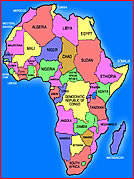Sunday, May 16, 2010
 Africa’s business and social elite at the recentlyconcluded World Economic Forum Africa in Dar es Salaam were asked at the outset what they thought is the greatest opportunity for Africa now. Read an African panel report here.
Africa’s business and social elite at the recentlyconcluded World Economic Forum Africa in Dar es Salaam were asked at the outset what they thought is the greatest opportunity for Africa now. Read an African panel report here.
Africa’s business and social elite at the recentlyconcluded World Economic Forum Africa in Dar es Salaam were asked at the outset what they thought is the greatest opportunity for Africa now. Responses ranged from agriculture, regional integration, energy and infrastructure, trade and new partnerships, to ‘humble leadership’ and demographic growth
Deeply striking has been the strong sense that the future looks good – despite, not because of, the governance picture. Wobbles a year ago about impending crisis have been displaced by a sense of confidence – ‘the future is African’. The value of its natural resources, its relative lack of development, and growing domestic and international markets present a dazzling array of opportunities. Optimism is reinforced by underlying growth trends and by the speed with economies appear to be recovering from the global crisis – in terms of trade, investment and GDP growth.
The presence of former and serving Heads of State has not masked scepticism about the quality of political leadership. Issues range from the patchiness of the rule of law (with leaders cited as poor role models); insecurity and lawlessness which, if anything, are seen as increasing; and corruption. The capacity and independence of constitutional bodies and the civil service are viewed as a major problem. And inequality, a basic yardstick of economic governance, is increasing.
A strong undertow is concern about human capital – education and health, urbanization and dislocation, knowledge and, surprisingly, ‘cultural attitudes’. Welcome emphasis is being placed on fast forwarding women’s empowerment – not just as agents of economic growth and social progress, or for reasons of equity, but also to improve management decisions and, quite simply, practical capacities to get things done.
All this is prompting healthy debate about the role of business in adding social and environmental value. What kind of partnership is required with government and development agencies? There is now a growing body of experience, success stories and models, to draw upon.
But the thorny issue of poor governance remains relatively unaddressed. The respective roles of government and business should not be confused. But is ‘do no harm’, and compacts on corruption and transparency, enough? Is there a role for business in rule of law, stemming inequality, in institution building? Or, as a participant put it, is Africa ‘doomed to success’ despite weak governance?


